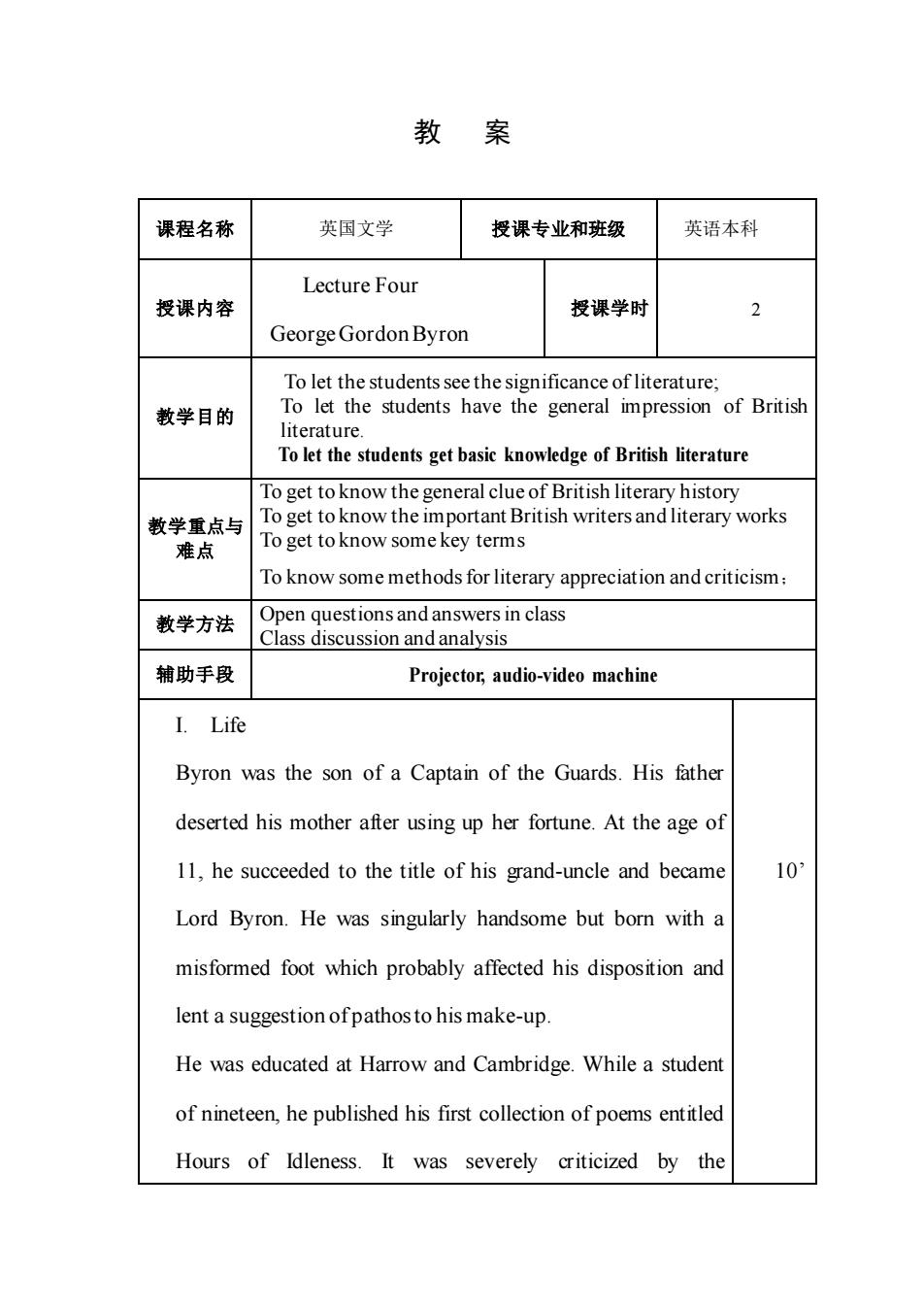
教案 课程名称 英国文学 授课专业和班级 英语本科 Lecture Four 授课内容 授课学时 2 George Gordon Byron To let the students see the significance of literature; 教学目的 To let the students have the general impression of British literature. To let the students get basic knowledge of British literature To get to know the general clue of British literary history 教学重点与 To get to know the important British writers and literary works 难点 To get to know some key terms To know some methods for literary appreciation and criticism: 教学方法 Open questions and answers in class Class discussion and analysis 辅助手段 Projector,audio-video machine I.Life Byron was the son of a Captain of the Guards.His fathe deserted his mother after using up her fortune.At the age of 11,he succeeded to the title of his grand-uncle and became 0 Lord Byron.He was singularly handsome but born with a misformed foot which probably affected his disposition and lent a suggestion ofpathos to his make-up. He was educated at Harrow and Cambridge.While a student of nineteen,he published his first collection of poems entitled Hours of Idleness.It was severely criticized by the
教 案 课程名称 英国文学 授课专业和班级 英语本科 授课内容 Lecture Four George Gordon Byron 授课学时 2 教学目的 To let the students see the significance of literature; To let the students have the general impression of British literature. To let the students get basic knowledge of British literature 教学重点与 难点 To get to know the general clue of British literary history To get to know the important British writers and literary works To get to know some key terms To know some methods for literary appreciation and criticism; 教学方法 Open questions and answers in class Class discussion and analysis 辅助手段 Projector, audio-video machine I. Life Byron was the son of a Captain of the Guards. His father deserted his mother after using up her fortune. At the age of 11, he succeeded to the title of his grand-uncle and became Lord Byron. He was singularly handsome but born with a misformed foot which probably affected his disposition and lent a suggestion of pathos to his make-up. He was educated at Harrow and Cambridge. While a student of nineteen, he published his first collection of poems entitled Hours of Idleness. It was severely criticized by the 10’
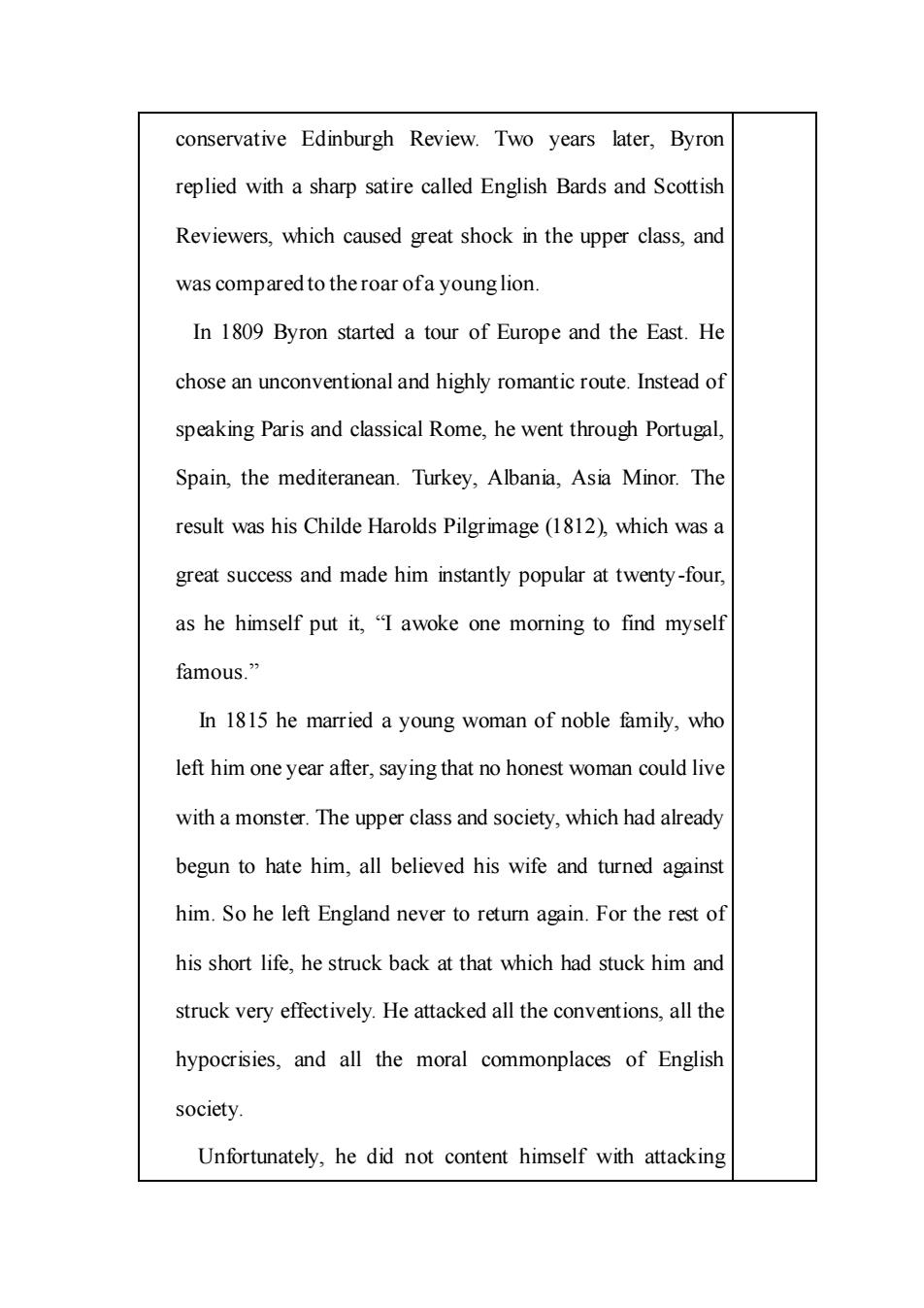
conservative Edinburgh Review.Two years later,Byron replied with a sharp satire called English Bards and Scottish Reviewers,which caused great shock in the upper class,and was compared to the roar ofa young lion. In 1809 Byron started a tour of Europe and the East.He chose an unconventional and highly romantic route.Instead of speaking Paris and classical Rome,he went through Portugal, Spain,the mediteranean.Turkey,Albania,Asia Minor.The result was his Childe Harolds Pilgrimage(1812),which was a great success and made him instantly popular at twenty-four, as he himself put it,"I awoke one morning to find myself famous.” In 1815 he married a young woman of noble family,who left him one year after,saying that no honest woman with a monster.The upper class and society,which had already begun to hate him,all believed his wife and turned against him.So he left England never to retur again.For the rest of his short life,he struck back at that which had stuck him and struck very effectively.He attacked all the conventions,all the hypocrisies,and all the moral commonplaces of English society. Unfortunately,he did not content himself with attacking
conservative Edinburgh Review. Two years later, Byron replied with a sharp satire called English Bards and Scottish Reviewers, which caused great shock in the upper class, and was compared to the roar of a young lion. In 1809 Byron started a tour of Europe and the East. He chose an unconventional and highly romantic route. Instead of speaking Paris and classical Rome, he went through Portugal, Spain, the mediteranean. Turkey, Albania, Asia Minor. The result was his Childe Harolds Pilgrimage (1812), which was a great success and made him instantly popular at twenty-four, as he himself put it, “I awoke one morning to find myself famous.” In 1815 he married a young woman of noble family, who left him one year after, saying that no honest woman could live with a monster. The upper class and society, which had already begun to hate him, all believed his wife and turned against him. So he left England never to return again. For the rest of his short life, he struck back at that which had stuck him and struck very effectively. He attacked all the conventions, all the hypocrisies, and all the moral commonplaces of English society. Unfortunately, he did not content himself with attacking
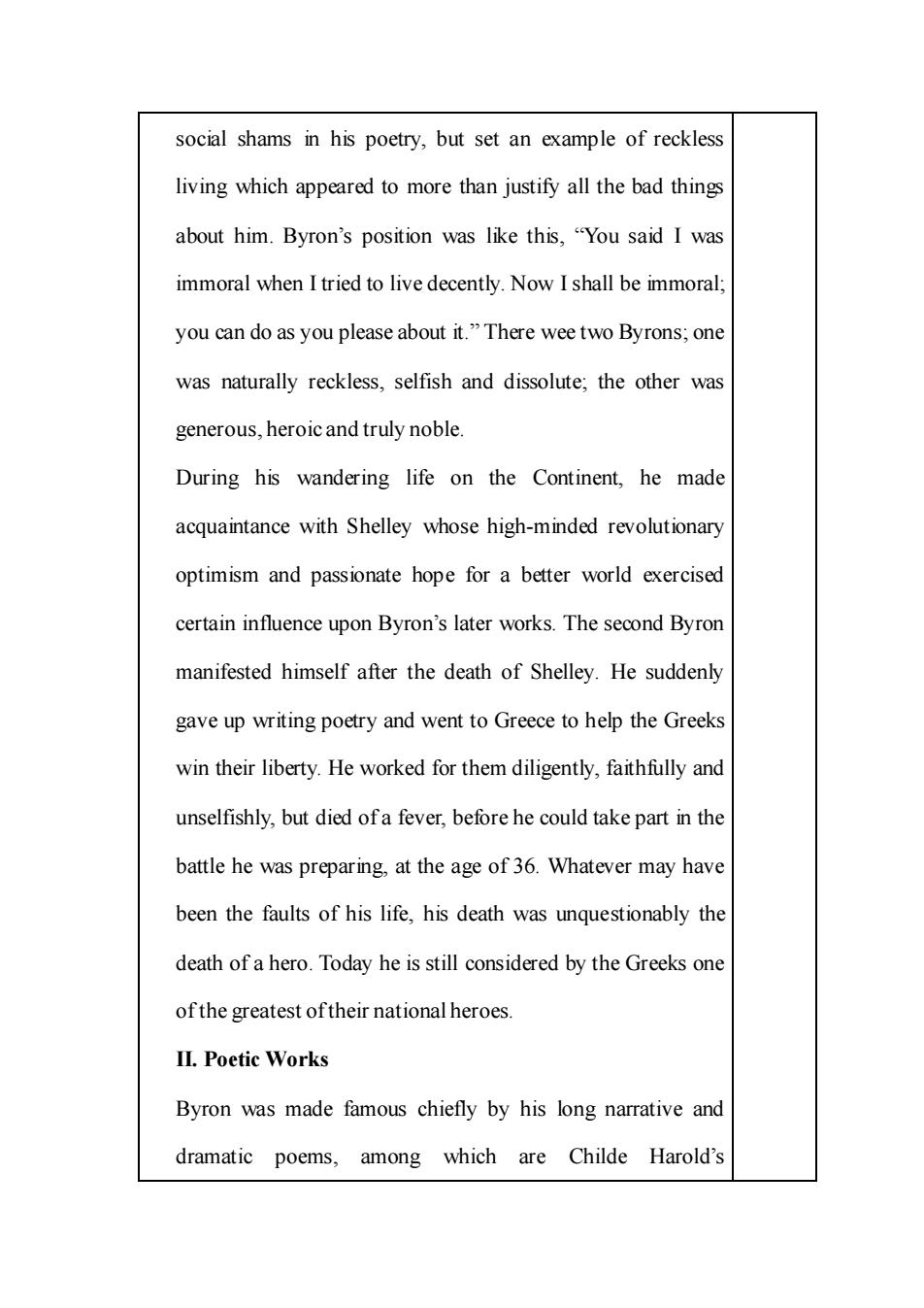
social shams in his poetry,but set an example of reckless living which appeared to more than justify all the bad things about him.Byron's position was like this,"You said I was immoral when I tried to live decently.Now I shall be immoral you can do as you please about it."There wee two Byrons;one was naturally reckless,selfish and dissolute;the other was generous,heroic and truly noble. During his wandering life on the Continent,he made acquaintance with Shelley whose high-minded revolutionary optimism and passionate hope for a better world exercised certain influence upon Byron's later works.The second Byron manifested himself after the death of Shelley.He suddenly gave up writing poetry and went to Greece to help the Greeks win their liberty.He worked for them diligently,faithfully and unselfishly,but died ofa fever,before he could take part in the battle he was preparing,at the age of 36.Whatever may have been the faults of his life,his death was unquestionably the death of a hero.Today he is still considered by the Greeks one of the greatest oftheir national heroes. II.Poetic Works Byron was made famous chiefly by his long narrative and dramatic poems,among which are Childe Harold's
social shams in his poetry, but set an example of reckless living which appeared to more than justify all the bad things about him. Byron’s position was like this, “You said I was immoral when I tried to live decently. Now I shall be immoral; you can do as you please about it.” There wee two Byrons; one was naturally reckless, selfish and dissolute; the other was generous, heroic and truly noble. During his wandering life on the Continent, he made acquaintance with Shelley whose high-minded revolutionary optimism and passionate hope for a better world exercised certain influence upon Byron’s later works. The second Byron manifested himself after the death of Shelley. He suddenly gave up writing poetry and went to Greece to help the Greeks win their liberty. He worked for them diligently, faithfully and unselfishly, but died of a fever, before he could take part in the battle he was preparing, at the age of 36. Whatever may have been the faults of his life, his death was unquestionably the death of a hero. Today he is still considered by the Greeks one of the greatest of their national heroes. II. Poetic Works Byron was made famous chiefly by his long narrative and dramatic poems, among which are Childe Harold’s
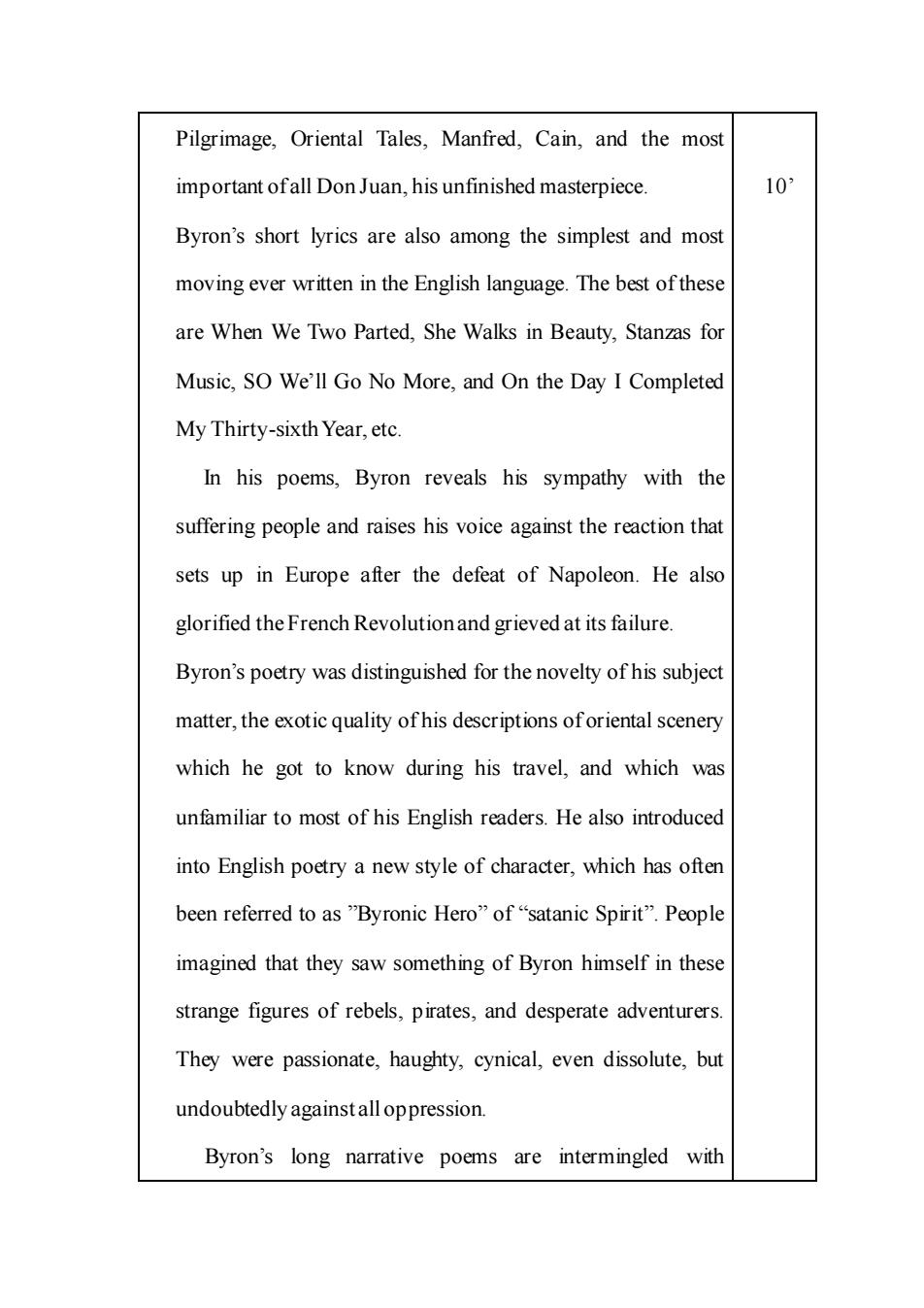
Pilgrimage,Oriental Tales,Manfred,Cain,and the most important ofall Don Juan,his unfinished masterpiece. 10 Byron's short lyrics are also among the simplest and most moving ever written in the English language.The best ofthese are When We Two Parted,She Walks in Beauty,Stanzas for Music,SO We'll Go No More,and On the Day I Completed My Thirty-sixth Year,etc. In his poems,Byron reveals his sympathy with the suffering people and raises his voice against the reaction that sets up in Europe after the defeat of Napoleon.He also glorified the French Revolutionand grieved at its failure. Byron's poetry was distinguished for the novelty of his subject matter,the exotic quality ofhis descriptions oforiental scenery which he got to know during his travel,and which was unfamiliar to most of his English readers.He also introduced into English poetry a new style of character,which has often been referred to as"Byronic Hero"of"satanic Spirit".People imagined that they saw something of Byron himself in these strange figures of rebels,pirates,and desperate adventurers They were passionate,haughty,cynical,even dissolute,but undoubtedly againstall oppression. Byron's long narrative poems are intermingled with
Pilgrimage, Oriental Tales, Manfred, Cain, and the most important of all Don Juan, his unfinished masterpiece. Byron’s short lyrics are also among the simplest and most moving ever written in the English language. The best of these are When We Two Parted, She Walks in Beauty, Stanzas for Music, SO We’ll Go No More, and On the Day I Completed My Thirty-sixth Year, etc. In his poems, Byron reveals his sympathy with the suffering people and raises his voice against the reaction that sets up in Europe after the defeat of Napoleon. He also glorified the French Revolution and grieved at its failure. Byron’s poetry was distinguished for the novelty of his subject matter, the exotic quality of his descriptions of oriental scenery which he got to know during his travel, and which was unfamiliar to most of his English readers. He also introduced into English poetry a new style of character, which has often been referred to as ”Byronic Hero” of “satanic Spirit”. People imagined that they saw something of Byron himself in these strange figures of rebels, pirates, and desperate adventurers. They were passionate, haughty, cynical, even dissolute, but undoubtedly against all oppression. Byron’s long narrative poems are intermingled with 10’
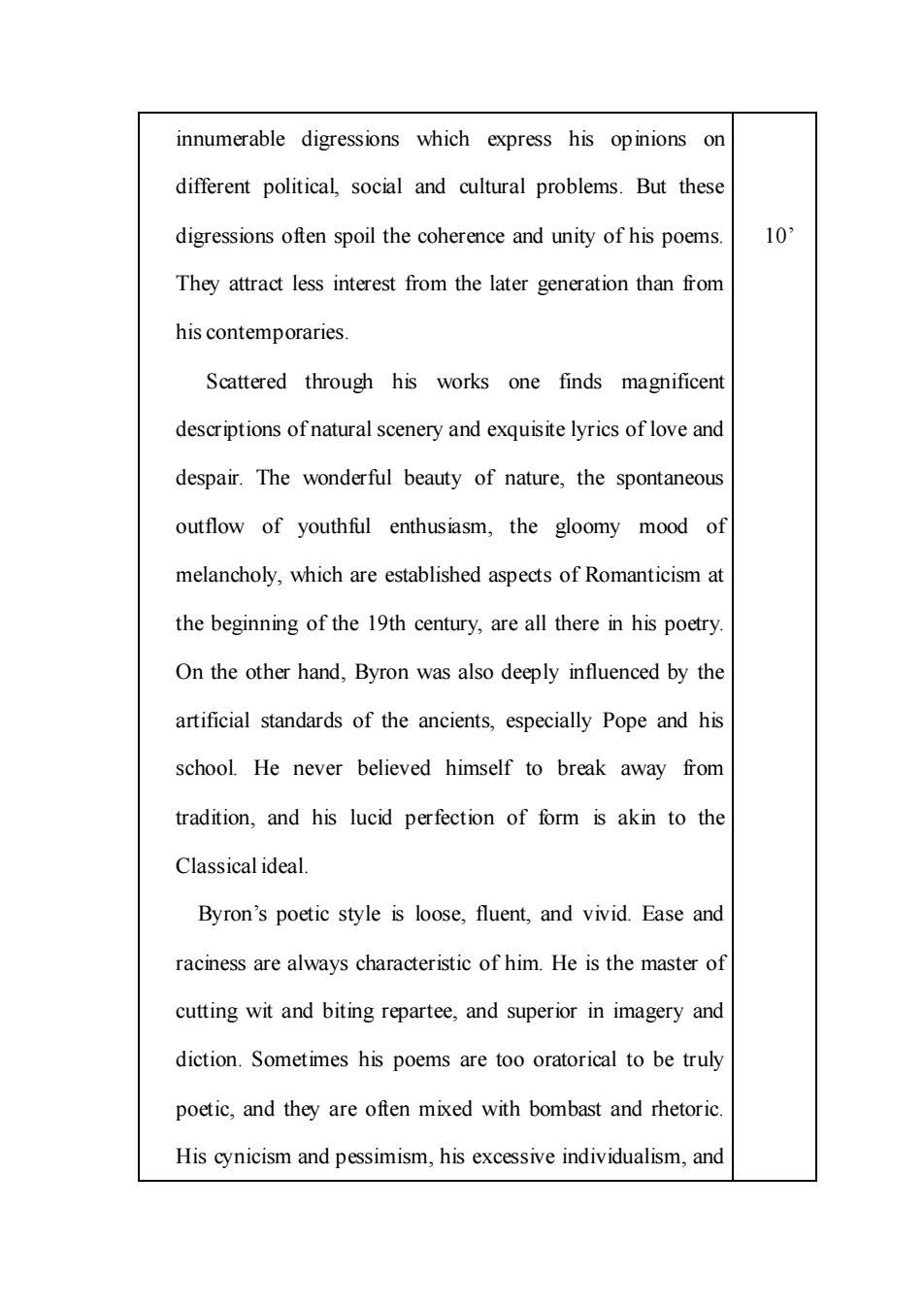
innumerable digressions which express his opinions on different political,social and cultural problems.But these digressions often spoil the coherence and unity of his poems. 10: They attract less interest from the later generation than from his contemporaries. Scattered through his works one finds magnificent descriptions ofnatural scenery and exquisite lyrics of love and despair.The wonderful beauty of nature,the spontaneous outflow of youthful enthusiasm,the gloomy mood of melancholy,which are established aspects of Romanticism at the beginning of the 19th century,are all there in his poetry. On the other hand,Byron was also deeply influenced by the artificial standards of the ancients,especially Pope and his school.He never believed himself to break away from tradition,and his lucid perfection of form is akin to the Classical ideal. Byron's poetic style is loose,fluent,and vivid.Ease and raciness are always characteristic of him.He is the master of cutting wit and biting repartee,and superior in imagery and diction.Sometimes his poems are too oratorical to be truly poetic,and they are often mixed with bombast and rhetoric. His cynicism and pessimism,his excessive individualism,and
innumerable digressions which express his opinions on different political, social and cultural problems. But these digressions often spoil the coherence and unity of his poems. They attract less interest from the later generation than from his contemporaries. Scattered through his works one finds magnificent descriptions of natural scenery and exquisite lyrics of love and despair. The wonderful beauty of nature, the spontaneous outflow of youthful enthusiasm, the gloomy mood of melancholy, which are established aspects of Romanticism at the beginning of the 19th century, are all there in his poetry. On the other hand, Byron was also deeply influenced by the artificial standards of the ancients, especially Pope and his school. He never believed himself to break away from tradition, and his lucid perfection of form is akin to the Classical ideal. Byron’s poetic style is loose, fluent, and vivid. Ease and raciness are always characteristic of him. He is the master of cutting wit and biting repartee, and superior in imagery and diction. Sometimes his poems are too oratorical to be truly poetic, and they are often mixed with bombast and rhetoric. His cynicism and pessimism, his excessive individualism, and 10’